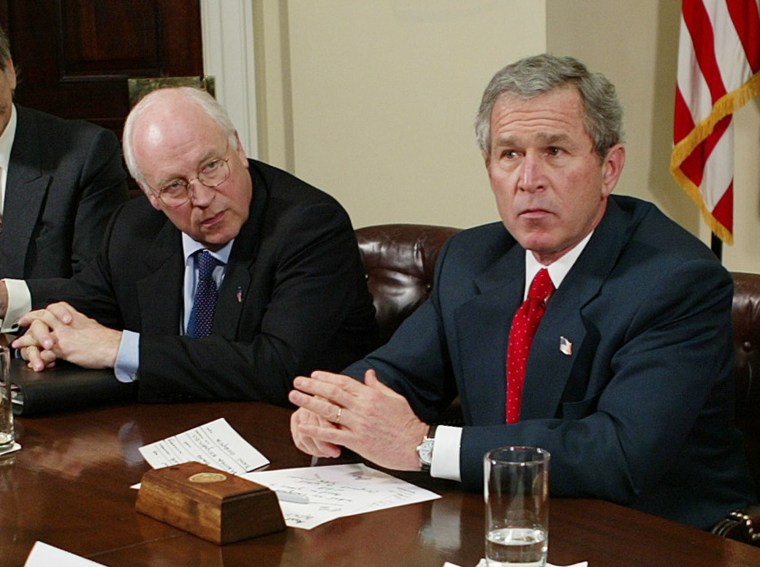When former New York Sen. Al D’Amato suggested this week the time had come for President Bush to replace Vice President Dick Cheney with either Secretary of State Colin Powell or Arizona Sen. John McCain as his running mate, was D’Amato voicing Republican hopes and Democratic fears? Or was he simply being provocative?
"On through September, the Democratic ticket of Kerry-Edwards could very well build an insurmountable lead among a public that is hungry for change,” said one Washington-based political consultant, speaking on condition of anonymity.
“If Cheney is dropped it would be the highest example of desperation in the history of presidential elections,” he said. “Without a doubt, it would happen in response to the fear Republicans have at Edwards being selected as Kerry’s VP."
While some Democrats acknowledge they’d love Cheney to stay on the ticket because they consider him a drag on Bush, most want to talk instead about their exuberance over Edwards.
Bush will play his hand
“I take the president at face value when he says that he is going to stand by Cheney,” said Washington-based Democratic campaign consultant Jim Duffy. Dumping Cheney? “I just don’t see it,” Duffy said. “It flies in the face of how Bush plays his hands. I see the president playing the hand he has right to the bitter end.”
Democrats, Duffy said, “are talking about how elated they are about the Kerry-Edwards ticket. This (Cheney speculation) is not something I see Democrats engaging in.”
“We’re praying Cheney stays on the ticket,” California Democratic Party spokesman Bob Mulholland said. “Cheney is an albatross around the neck of the president, so Democrats are supporting Cheney.”
Mulholland noted that on Tuesday the Bush-Cheney campaign unveiled a new television ad featuring McCain.
“It wasn’t featuring Cheney,” Mulholland noted. “If Cheney were a plus for the ticket, they’d have him out there in that ad.”
“I’m hoping it doesn’t happen,” Mulholland said of a Cheney exit. “We want Cheney so we can beat up on him for the next four months.”
Mulholland said that one potentially troublesome story for Cheney that may get wider exposure in the next four months is the Securities and Exchange Commission’s investigation of alleged payments of $180 million in bribes by several firms, including a subsidiary of Halliburton, to officials in Nigeria, in order to smooth construction of a liquefied natural gas complex off the Nigerian coast.
Some of the payments were allegedly made at the time Cheney was chief executive of Halliburton.
Halliburton spokeswoman Wendy Hall said, "We are working with officials in Europe and the United States as well as conducting our own investigation to determine the truth of these unproven assertions. We do not believe that the company has violated the Foreign Corrupt Practices Act," a U.S. law that prohibits payments of bribes by American firms to foreign officials.
The Bush-Cheney campaign did not immediately return a call seeking comment on the Nigeria allegation.
D'Amato urges 'bold stroke'
For his part, D’Amato portrayed his dump-Cheney proposal as a move not dictated by the urgent need to avoid Republican defeat, but rather as way to bulk up Bush’s victory margin.
"While I believe George Bush will win re-election even without this bold stroke, he will insure a broader, deeper, more resonant reaffirmation of his leadership if he places his duty to continue as president above any one individual," D'Amato said.
But tradition and logic suggest that such a “bold stroke” would be necessitated only if the vice president’s heart ailment really did require him to step down or if Bush and his strategists thought his re-election hopes were slipping away.
Polling data released Thursday suggested that while Edwards’ selection as vice presidential candidate may have given Kerry a positive bump, Bush-Cheney is still quite competitive.
A John Zogby poll released Thursday showed the Kerry-Edwards ticket only two percentage points ahead of Bush and Cheney, a lead within the poll’s margin of error.
An Associated Press poll released Thursday found that 50 percent supported the Bush-Cheney ticket while 46 percent chose the Kerry-Edwards ticket, within that question's margin of error of 4.5 percentage points.
Threshold for drama
In an era of spectacular political events, from Bill Clinton’s impeachment to the 2000 election recount to the airplane crash deaths of Democratic Senate candidates Mel Carnahan in 2000 and Sen. Paul Wellstone in 2002, the electorate’s threshold for drama has been raised.
But by any standard, a Cheney adieu would qualify as truly dramatic.
A memo written by a Washington-based political consultant and currently making the rounds in the capital sketches a Cheney exit scenario.
The memo notes Bush’s low job approval ratings in national polls.
“Only dramatic events create dramatic opportunities to change these perceptions. Why? During dramatic events the public’s attention is fixated on nothing else but the event in question,” the memo says.
A Cheney resignation would, it says, push Kerry and Edwards to the side. The news media coverage of who’d replace Cheney would be “pervasive and overwhelming. With less than a week to the Democratic Convention, little attention is given to Senator Kerry’s policy and political agenda. The Democratic nominee is relegated to the second-tier of the news cycle.”
A Cheney resignation would give Bush the opportunity to nominate his successor who, under the 25th Amendment to the Constitution, would have to be confirmed by a majority vote of the House and the Senate.
The memo assumes McCain would be the nominee.
“Can Sen. Kerry vote against the Vice-President select? Of course not,” the memo says. “Can he vote for him? Of course not. Can he abstain? Of course not. There is no right answer…. Can anyone imagine a more dramatic moment in recent political history?”
And perhaps it is a moment that will play out only in the summer nightmares of some Democrats.
